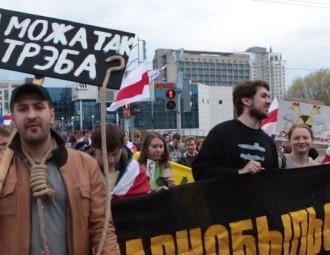Uladzimir Matskevich: State ideology doesn’t suggest remembering Chernobyl and its consequences

Paucity of “Chernobyl Way” doesn’t mean that the society forgot about the Chernobyl catastrophe as such. It only shows how society treats opposition.
On the 29th anniversary of catastrophe at Chernobyl NPP Aliaksandr Lukashenka didn’t talk about Chernobyl - he demonstratively left to inspect the production of “clean production” at “Slavgorodsky” public corporation.
Belarusan opposition met the anniversary of Chernobyl catastrophe with traditional “Chernobyl Way” that didn’t even gather 500 people. From year to year this demonstration gathers less and less people.
In general, there is no habit to talk about Chernobyl aloud in post-Chernobyl Belarus: either Belarusans forget about Chernobyl or they no longer believe neither authorities nor the opposition.
“EuroBelarus” Information Service tried to find explanation to Chernobyl silence from Uladzimir Matskevich, philosopher and methodologist, the head of the Board of the International Consortium “EuroBelarus “.
- After 20 years Belarusan authorities is treating Chernobyl catastrophe according to the principle “the less people know the better”. Why do authorities neglect the ways of overcoming the consequences of the Chernobyl catastrophe but switch to the production of “clean production” in Chernobyl zone?
- It’s hard for me to understand the logic of Lukashenka’s actions.
On the one hand, Chernobyl catastrophe is a huge wound for all Belarusans. This wound is still open for all Belarusans, though people prefer not to twist a knife in it. Regardless of whether people were in Chernobyl zone or not, whether they are liquidators, migrants from the contaminated areas, or neighbors of the migrants – Chernobyl disaster affected everyone in Belarus. Frequency of some diseases, threat of infection still hangs over people, since half-life of heavy metals will be lasting very long.
Today’s state ideology might be suggesting to tune to neglecting Chernobyl and its consequences. That is why Lukashenka demonstratively pretends that the contamination area isn’t dangerous.
- It is not only that the official authorities prefer to keep silent about Chernobyl but also are erecting Belarusan NPP. What for?
- It is very hard to understand the logic of the Belarusan authorities. Perhaps, they are viewing it as a means of getting energetic economic safety and independence. On the other hand, being the country that has suffered from the Chernobyl catastrophe most, Belarus should be very attentive to the nuclear power not only inside the country but also in the neighboring countries. But Lukashenka has decided to build his own NPP instead. Such actions might be related to lobbying “Rosatom” and Russia, so Lukashenka chose the easiest and one of the cheapest ways – to build a nuclear power plant.
- In contrast to the authorities, the opposition remembers Chernobyl. How efficiently do the opponents of the acting authorities use the topic of Chernobyl?
- Unfortunately, opposition only remembers Chernobyl on April 26, organizing traditional demonstration “Chernobyl Way”. The demonstration becomes less numerous with each year, which proves that the society is losing its interest towards the opposition. It doesn’t necessarily mean that the society forgot about Chernobyl catastrophe as such. It only shows how society treats opposition. I think that the opposition is using the trauma inflicted by the Chernobyl catastrophe ineffectively, just like the other causes.
Belarusan opposition doesn’t seem to reach agreement with ecologic green organizations. Belarus has “green” parties for some time; but nothing came out of it. I think that in the near future the authorities might seize the initiative and tame ecologic movement. It happened before and is happening now. It might even happen that on the eve of the presidential elections leadership in the “Party of Greens” changes and becomes even more pro-government, which will disunite opposition and push away society from the opposition.
- Why is “Chernobyl Way” gathering less and less people with each next year? Uladzimir Niakliaeu says that the opposition should change its tactics. What conclusions did you make by results of the Sunday demonstration?
- Paucity of “Chernobyl Way” didn’t come as a surprise for me. Constantly tracing the moods and the situation in the country I understood that it couldn’t be the other way.
Niakliaeu’s statement has been due long time ago. However, his words deserve serious consideration, as these are not only the words of a politician, political scientist, but also the words of a man who was in the center of political life during the last 5-6 years. If the opposition doesn’t listen to him, it will mean the end of the political opposition as such.
But even the blind understand that political parties lost the factual status of parties and are pointless in this form. Consolidation of broad social movement that would include not only parliamentary and local candidates, but all activists, is needed.
-
03.01
-
07.10
-
22.09
-
17.08
-
12.08
-
30.09








































